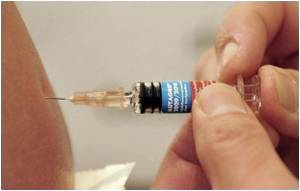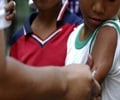A US law protects vaccine makers from lawsuits filed for serious side effects caused by childhood inoculations, the Supreme Court ruled.

The case concerned Hannah Bruesewitz, who as a six-month-old infant received a series of injections to protect her against diphtheria, tetanus and pertussis, the illness also known as whooping cough.
The family, from the northeastern state of Pennsylvania, found that after the third injection, the cognitive development of their now-teenaged daughter slowed dramatically and she developed seizures and other health problems that continue to this day.
The family insists that the girl's medical problems were a side-effect of the vaccine; Wyeth, the manufacturer, over the years has steadfastly denied any link exists between the girl's condition and its vaccine.
The US high court ruled that the vaccine maker, which is owned by Pfizer Inc, the world's largest pharmaceutical company, is not subject to the liability laws that govern some other products.
The court ruled that design-defect lawsuits were preempted by a 1986 law, the National Childhood Vaccine Injury Act, which created a national compensation program for vaccine-injury claims, and also gave vaccine makers protection from some lawsuits.
Advertisement
The ruling also affirms a lower court decision that also had found in favor of Wyeth.
Advertisement
"Today's Supreme Court decision protects children by strengthening our national immunization system and ensuring that vaccines will continue to prevent the spread of infectious diseases in this country," the physicians' group's president Marion Burton said.
"Today, the US Supreme Court affirmed what pediatricians have been advocating for decades" Burton said. "Vaccines save lives."
Wyeth, meanwhile, in a statement released Tuesday said it also was "pleased."
"We have great sympathy for the Bruesewitzes. We recognize, however, that the Vaccine Act provides for full consideration of the liability issues through the National Vaccine Injury Compensation Program.
"Here the Vaccine Court concluded that the petitioners failed to prove their child's condition was caused by vaccination," the company statement said.
Source-AFP









